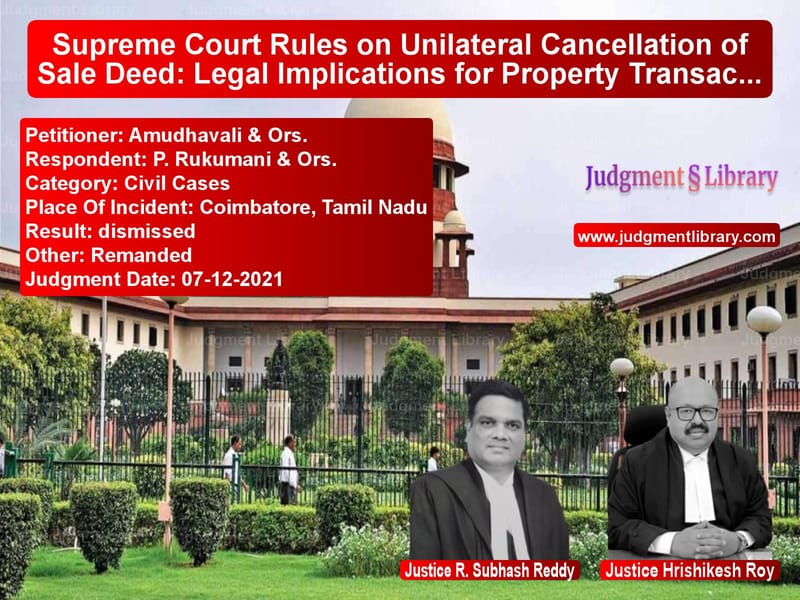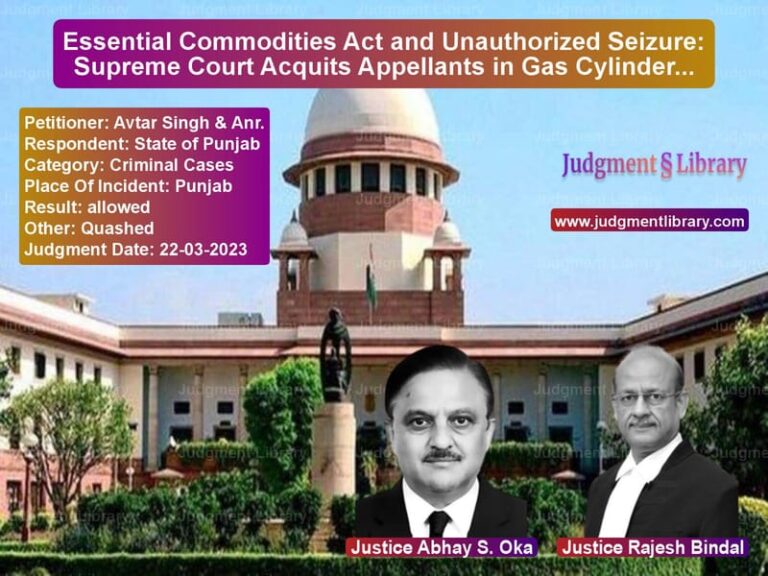Supreme Court Rules on Unilateral Cancellation of Sale Deed: Legal Implications for Property Transactions
In a recent landmark judgment, the Supreme Court of India ruled on the legality of unilateral cancellation of sale deeds and its implications for property transactions. The case, Amudhavali & Ors. v. P. Rukumani & Ors., involved a dispute over the cancellation of a registered sale deed by the original owners, leading to legal proceedings over property ownership and transfer rights. The ruling clarifies the legal standing of sale deeds, unilateral cancellations, and the proper recourse for affected parties.
Background of the Case
The dispute arose over land in Kalapatti Village, Coimbatore, originally owned by respondents (P. Rukumani & Ors.). The respondents executed a registered power of attorney in favor of another respondent (Respondent No. 7). Based on this authorization, the appellants (Amudhavali & Ors.) purchased the land via a registered sale deed dated March 9, 2005. However, soon after the sale, the original owners (Respondent Nos. 1 to 4) unilaterally canceled the sale deed and registered the cancellation deed on September 20, 2007.
Following this, the original owners also sold a portion of the land (0.25 cents) to a third party (Respondent No. 8) through another registered sale deed dated February 27, 2009. Aggrieved by these actions, the appellants filed a writ petition (No. 6329 of 2009) before the Madras High Court, challenging the unilateral cancellation and the subsequent sale.
Arguments by the Appellants
The appellants, who had purchased the property in good faith, presented the following key arguments:
- The unilateral cancellation of a registered sale deed is illegal, void, and against public policy.
- Once the sale deed was executed, the original owners lost their rights over the property.
- The unilateral cancellation deprived them of their property rights without their consent.
- The subsequent sale to a third party (Respondent No. 8) further complicated their ownership rights and must be declared void.
- The High Court should quash the cancellation deed and restore their legal rights as bona fide purchasers.
Arguments by the Respondents
The original owners (Respondents 1 to 4) defended their actions with the following counterarguments:
- The appellants delayed in filing the writ petition (filed in 2009, two years after the cancellation deed was registered in 2007), making their claim subject to laches and delay.
- They had duly informed the appellants about the cancellation, but no action was taken.
- A civil suit (O.S. No. 142 of 2008) was already pending before the IIIrd Additional Subordinate Court, Coimbatore, seeking a declaration that the sale deed dated March 9, 2005, was void.
- The dispute involved factual and legal issues that should be adjudicated by the civil court, not the High Court through a writ petition.
Madras High Court Ruling
The single-judge bench of the Madras High Court ruled in favor of the appellants, stating that a unilateral cancellation of a registered sale deed is legally impermissible unless consented to by the purchaser or adjudicated by a competent court. The court quashed the cancellation deed, restoring the appellants’ ownership.
However, the original owners appealed, and the Division Bench of the High Court overturned the single-judge order, holding that the dispute involved substantial factual and legal questions that required adjudication in the pending civil suit.
Supreme Court’s Observations and Ruling
On appeal, the Supreme Court examined the issues in light of legal precedents. The key observations of the Court were:
- Unilateral cancellation of a registered sale deed is legally void. Once a sale deed is executed and registered, ownership is transferred, and the seller loses rights over the property.
- Cancellation must be done through mutual consent or by court order. A seller cannot unilaterally revoke a sale deed without the consent of the buyer or without approaching a civil court for annulment.
- The judgment in Satya Pal Anand v. State of Madhya Pradesh (2016) was distinguishable, as it dealt with the cancellation of allotments in cooperative societies, not registered sale deeds.
- The judgment in Thota Ganga Laxmi v. Government of Andhra Pradesh (2010) was applicable, where the Supreme Court had held that unilateral cancellation of a sale deed by the vendor was not recognized under the Registration Act, 1908.
The Supreme Court ruled:
“Once a sale deed is registered, the title of the property is transferred to the purchaser. A unilateral cancellation deed, without a competent court’s declaration, is void ab initio. The appellants’ rights will be determined in the pending civil suit.”
Read also: https://judgmentlibrary.com/supreme-court-upholds-banks-auction-of-property-in-loan-default-case/
Final Directions by the Supreme Court
The Supreme Court ruled that:
- The rights of the parties will be adjudicated in the pending civil suit (O.S. No. 142 of 2008).
- The High Court’s decision setting aside the single-judge order was upheld.
- Both parties were directed to maintain status quo regarding possession until the civil suit is resolved.
- The civil suit should be disposed of within one year.
Key Legal Precedents Considered
- Satya Pal Anand v. State of Madhya Pradesh (2016) – Distinguished as a case involving cooperative society allotments, not unilateral cancellation of sale deeds.
- Thota Ganga Laxmi v. Government of Andhra Pradesh (2010) – Held that a unilateral cancellation of a registered sale deed is void and has no legal effect.
- Kuldeep Singh Suri v. Surinder Singh (2008) – Reinforced that ownership is transferred upon execution and registration of a sale deed.
Implications of the Judgment
The Supreme Court’s ruling carries several important implications for property law:
- Unilateral cancellation of registered sale deeds is not legally valid. Once a sale deed is executed, ownership is transferred, and the seller cannot revoke it unilaterally.
- Proper legal procedures must be followed. If a seller disputes a sale, they must seek a court declaration rather than executing a unilateral cancellation.
- Buyers are protected. The judgment provides legal protection to buyers against wrongful cancellations and fraudulent claims.
- Civil courts have jurisdiction over sale deed disputes. Any dispute over the validity of a sale deed must be adjudicated through a civil suit, not a writ petition.
Final Verdict
The Supreme Court’s ruling in Amudhavali & Ors. v. P. Rukumani & Ors. is a reaffirmation of the settled legal principle that a registered sale deed cannot be unilaterally canceled. This ruling ensures that property transactions remain secure and that ownership rights are not arbitrarily revoked by sellers. The judgment strengthens legal protections for bona fide purchasers and reinforces the need for due process in property disputes.
Petitioner Name: Amudhavali & Ors..Respondent Name: P. Rukumani & Ors..Judgment By: Justice R. Subhash Reddy, Justice Hrishikesh Roy.Place Of Incident: Coimbatore, Tamil Nadu.Judgment Date: 07-12-2021.
Don’t miss out on the full details! Download the complete judgment in PDF format below and gain valuable insights instantly!
Download Judgment: amudhavali-&-ors.-vs-p.-rukumani-&-ors.-supreme-court-of-india-judgment-dated-07-12-2021.pdf
Directly Download Judgment: Directly download this Judgment
See all petitions in Property Disputes
See all petitions in Specific Performance
See all petitions in Judgment by R. Subhash Reddy
See all petitions in Judgment by Hrishikesh Roy
See all petitions in dismissed
See all petitions in Remanded
See all petitions in supreme court of India judgments December 2021
See all petitions in 2021 judgments
See all posts in Civil Cases Category
See all allowed petitions in Civil Cases Category
See all Dismissed petitions in Civil Cases Category
See all partially allowed petitions in Civil Cases Category







